
The Invisible Woman is a superheroine appearing in American comic books published by Marvel Comics. Created by Stan Lee and Jack Kirby, the character first appeared in The Fantastic Four #1. Susan Storm is a founding member of the Fantastic Four and was the first female superhero created by Marvel during the Silver Age of Comic Books.
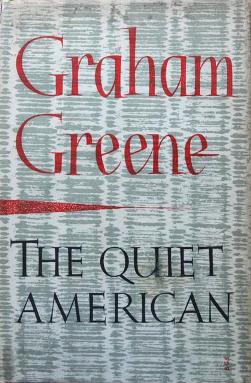
The Quiet American is a 1955 novel by English author Graham Greene.

Invisible Monsters is a novel by American writer Chuck Palahniuk, published in 1999. It is his third novel to be published, though it was his second written novel. The novel was originally supposed to be Palahniuk's first novel to be published, but it was rejected by the publisher for being too disturbing. After the success of his novel Fight Club, Invisible Monsters was given a second chance, and a revised version of it was published. The first edition was released in paperback in 1999, and on June 11, 2012, it was published in hardcover, in a revised edition titled Invisible Monsters Remix (ISBN 978-0393083521).

Dave the Barbarian is an American animated television series created by Doug Langdale for Disney Channel. The show centers on a barbarian named Dave and his friends and family, who go on surreal Medieval-themed adventures. The series premiered on January 23, 2004, and ended on January 22, 2005, with a total of one season with 21 episodes.
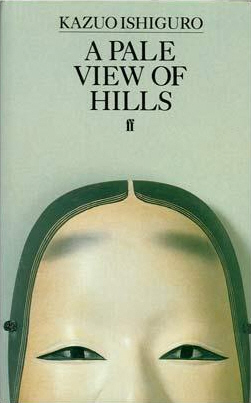
A Pale View of Hills (1982) is the first novel by Nobel Prize–winning author Kazuo Ishiguro. It won the 1982 Winifred Holtby Memorial Prize. He received a £1000 advance from publishers Faber and Faber for the novel after a meeting with Robert McCrum, the fiction editor.

London Fields is a blackly comic murder mystery novel by the British writer Martin Amis, published in 1989. The tone gradually shifts from high comedy, interspersed with deep personal introspections, to a dark sense of foreboding and eventually panic at the approach of the deadline, or "horrorday", the climactic scene alluded to on the very first page.

The Informers is a collection of short stories, linked by the same continuity, written by American author Bret Easton Ellis. The collection was first published as a whole in 1994. Chapters 6 and 7, "Water from the Sun" and "Discovering Japan", were published separately in the UK by Picador in 2007. The stories display attributes similar to Ellis's novels Less than Zero, The Rules of Attraction, and, to a lesser extent, American Psycho. Like many of Ellis's novels, the stories are set predominantly in California.

Winner Take Nothing is a 1933 collection of short stories by Ernest Hemingway. Hemingway's third and final collection of stories, it was published four years after A Farewell to Arms (1929), and a year after his non-fiction book about bullfighting, Death in the Afternoon (1932).
Tales of the Otori is a series of historical fantasy novels by Gillian Rubinstein, writing under the pen name Lian Hearn, set in a fictional world based on feudal Japan. The series initially consisted of a trilogy: Across the Nightingale Floor (2002), Grass for His Pillow (2003), and Brilliance of the Moon (2004). It was followed in 2006 by a sequel, The Harsh Cry of the Heron, and in 2007 by a prequel, Heaven's Net is Wide. In 2020, two new books were published in a sequel series called Children of the Otori, Orphan Warriors and Sibling Assassins.
"Across the Bridge" is a 1938 short story by Graham Greene. It was published in the 1947 collection Nineteen Stories. The work was filmed in 1957, starring Rod Steiger, and as Double Take in 2001.
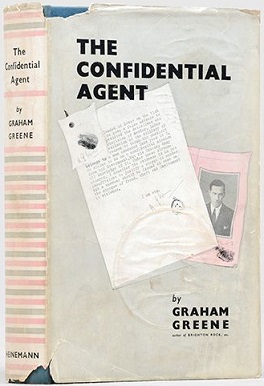
The Confidential Agent (1939) is a thriller novel by British author Graham Greene. Fuelled by Benzedrine, Greene wrote it in six weeks. To avoid distraction, he rented a room in Bloomsbury from a landlady who lived in a flat below him. He used that apartment in the novel and had an affair with the landlady's daughter. He wrote the book for money and was so displeased with his work that he wanted it published under a pseudonym. But critics took a far different view; The New York Times, for example, called the novel "a magnificent tour-de-force".

Aunts Aren't Gentlemen is a comic novel by P. G. Wodehouse, first published in the United Kingdom in October 1974 by Barrie & Jenkins, London, and in the United States under the title The Cat-nappers on 14 April 1975 by Simon & Schuster, New York. It was the last novel to feature some of Wodehouse's best known characters, Bertie Wooster and his resourceful valet Jeeves, and the last novel fully completed by Wodehouse before his death.
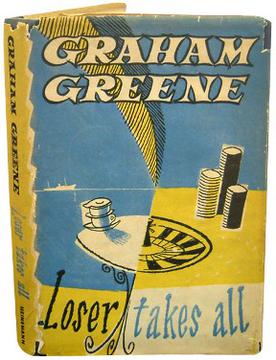
Loser Takes All is a 1955 novella by British author Graham Greene. In his dedication Greene said he had not written "this little story" to encourage "adultery, the use of pyjama tops, or registry office weddings. Nor is it meant to discourage gambling".
Graham Greene (1904–1991) was an English novelist regarded by many as one of the greatest writers of the 20th century. Combining literary acclaim with widespread popularity, Greene acquired a reputation early in his lifetime as a major writer, both of serious Catholic novels, and of thrillers. He was shortlisted, in 1966 and 1967, for the Nobel Prize for Literature. He produced 26 novels, as well as several plays, autobiographies, and short stories.

Betrachtung is a collection of eighteen short stories by Franz Kafka written between 1904 and 1912. It was Kafka's first published book, printed at the end of 1912 in the Rowohlt Verlag on an initiative by Kurt Wolff.

The Continent Makers is a science fiction novella by American writer L. Sprague de Camp, part of his Viagens Interplanetarias series. It was first published in the magazine Thrilling Wonder Stories in the issue for April, 1951. It first appeared in book form in the collection The Continent Makers and Other Tales of the Viagens, published in hardcover by Twayne Publishers in 1953, and in paperback by Signet Books in 1971. It has also been translated into Portuguese, Dutch, and Italian.
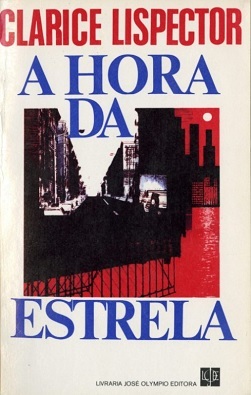
The Hour of the Star is a novel by Clarice Lispector published in 1977, shortly before the author's death. In 1985, the novel was adapted by Suzana Amaral into a film of the same name, which won the Silver Bear for Best Actress in the 36th Berlin International Film Festival of 1986. It has been translated into English twice by New Directions Publishing with Giovanni Pontiero's 1992 translation followed by Benjamin Moser's version in 2011.

Bedevil, styled BeDevil, is a 1993 Australian horror film directed by Tracey Moffatt, the first feature directed by an Australian Aboriginal woman.

The Future Foundation is a fictional organization appearing in American comic books published by Marvel Comics. Created by writer Jonathan Hickman, the team first appeared in Fantastic Four #579 and stars in the series FF, written by Hickman and illustrated by Steve Epting. The Future Foundation is a philanthropic organization created by Mister Fantastic to better serve humanity's future.
The Colored Girls of Passenack—Old and New is a work of short fiction by William Carlos Williams first published in the collection The Knife of the Times and Other Stories (1932) by Dragon Press.















